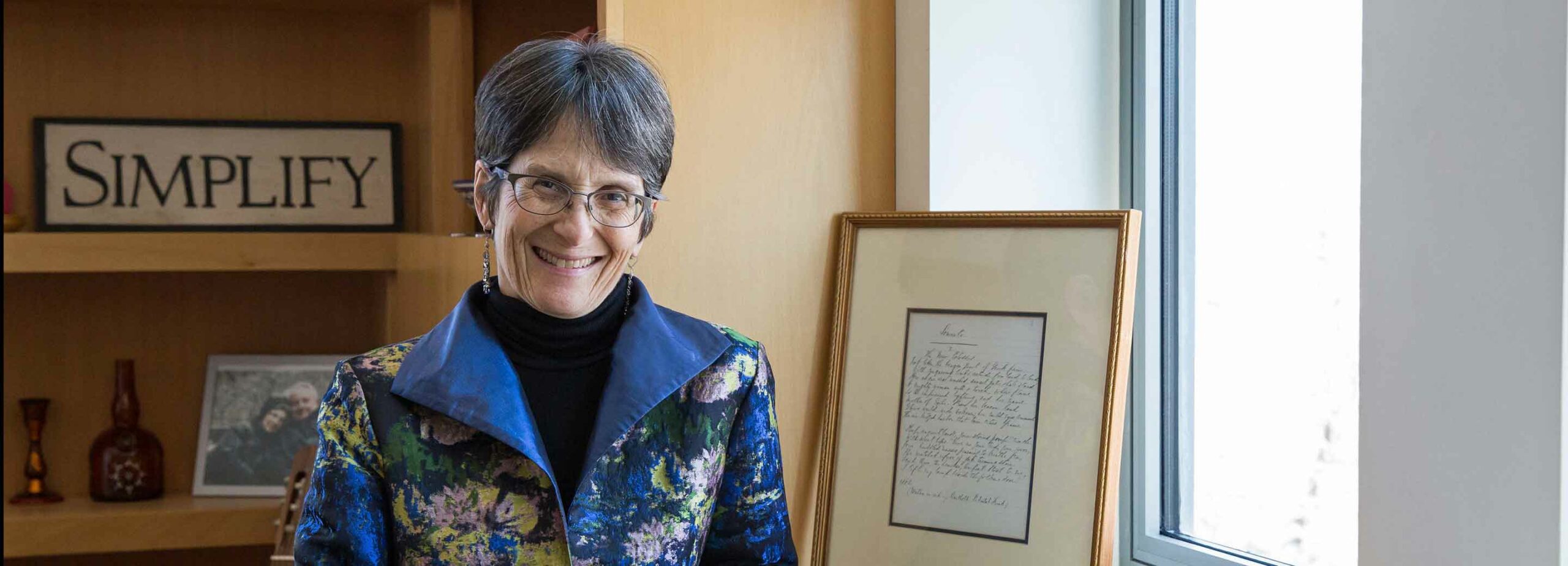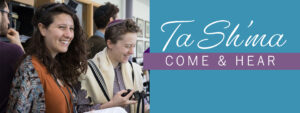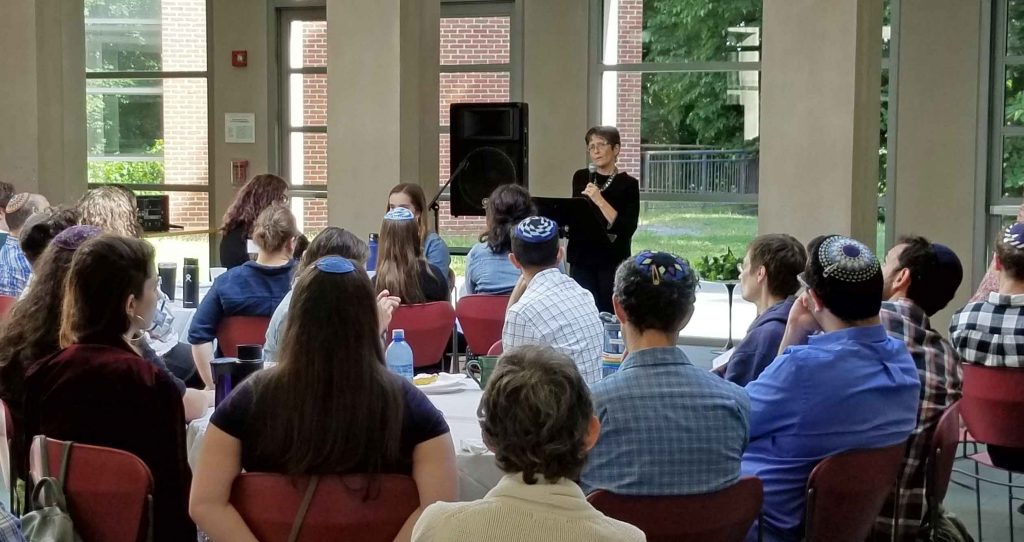Community Blog Learning, to be of service

One of the things I love most about being at Hebrew College has to do with the way we stand at the nexus of the academy and the community, in a place where learning is so deeply bound up with a sense of service – to the Jewish people, to the world, and to God.
I have spent a lot of time this summer thinking about that sense of service. In fact, I had a powerful experience at the Harvard Business School (HBS) in July that sent me into a bit of an identity crisis. (I don’t know if you will find this worrisome or reassuring, but powerful experiences often send me into an identity crisis – in the best sense of the term.)
I was participating in one of HBS’s executive leadership programs with 165 CEO’s of non-profits from 50 countries around the world. Over the course of that week, I came to feel close to extraordinary people working on enormous issues like sanitation in India, HIV in South Africa, poverty and illiteracy in Detroit, protection of endangered species all over the world.
So, of course, I thought a lot about: What am I working on? What are we working on?
This summer, the world has left me feeling a bit speechless at times, but as I return to this question this morning, I want to offer at least one response – one that is on my mind as we enter into Parashat Re’eh, and move towards Rosh Hodesh Elul.
The parsha begins with the command to see.
Re’eh Anochi noten lifneichem hayom bracha u’klala.
See. I set before you this day blessing and curse.
I want to linger for a moment on those two words – blessing and curse – b’racha u’klala.
The Hebrew root of b’racha – the word that means blessing, the word that we use more than any other to describe – and to address – God in our prayers, is connected to the Hebrew word for knee. Interesting, for a people whose posture in prayer is not kneeling but standing. This, after all, is part of how we know ourselves. We are Mordechai, we are the people that does not kneel.
And yet, here is this inner bow – an unspoken, or barely spoken recognition, that to live in relationship with God, to bless and be blessed by God, is to be willing to bend the knee, to be willing to admit and submit to something beyond ourselves, something higher than ourselves.
This is a stance of both gratitude and humility.
Gratitude: I am not the source of all that is good in my life. I have received more gifts than I can fathom, certainly more than I can adequately acknowledge. If I am an athlete, a student, an artist, a parent – I may work hard at all that I do (even very hard). But none of it would be possible without the gift of health, of intelligence, of creativity, of life itself.
Humility is a close companion of this sense of gratitude. I am not the source of all that is good – or bad – in my life. And there is much that is beyond my ability to control or understand.
My first teachers of humility were my parents; in our home hubris was the cardinal sin.
This played itself out particularly poignantly in relation to the field of medicine. My mother has always had a profound suspicion of doctors and their false sense of power and control. You might think that my father, a physician, would have been defensive about this. But, in fact, it was my father who taught us – and his students – that the measure of a good doctor is the ability to listen well, to deal with ambiguity and uncertainty, to sometimes do nothing, and to understand that ultimately life and death are in the hands of God.
There is another side to this bending of the knees that has been important in my own life. I vividly remember sitting in a study session in Jerusalem in the summer of 1993. Rabbi Jim Ponet was teaching about precisely this issue. About the awareness that we are only able to receive and acknowledge the blessings in our lives when we are willing to bow before God, to recognize our own katnut, our own smallness, our own unworthiness.
Suddenly, I found myself weeping. I was overcome with an awareness of how the opposite can also feel true. Have there not been times when I have felt so small, so unworthy, so inadequate that I have been unable to make room for any sense of blessing in my life? How can we feel blessed if we are filled with fear and insecurity?
The day after that class, our group began a five-day excursion through the Negev. The first morning after sleeping under the open sky, I woke up early. It was quiet in the way that only the desert can be quiet. I stood on one of the hilltops looking out at the horizon, at a seemingly endless expanse of sand and stone and sky. And I felt very small – in the way that only the desert can make you feel small.
But to feel small in the presence of the desert, I realized in that moment, is a very different thing than to feel small in the presence of other human beings. To feel small in the presence of God is a very different thing than to feel small in the presence of another person. In fact to feel small in the presence of God is to feel a sense of the radical equality and dignity of all human beings. Dignity that flows not from the status we achieve or the wealth we amass, but from knowing before Whom we stand. All of us.
This brings me to klala, the Hebrew word for curse.
I just learned something new about the world klala this summer – from an exchange on our list serve between a Hebrew College Rabbinical School graduate, Rabbi Minna Bromberg, and our resident Hebrew guru, Harvey Bock.
I had not known that the word klala is related to the Hebrew root kal – or “light.” To curse someone, then, is somehow to take them lightly, to be dismissive of them, to disregard the weight of their humanity, their dignity, the sanctity of their life. In this sense, it is the opposite of showing kavod – honor – which, of course, is connected to the root kaved – heavy or weighty.
Last night, Rabbi Art Green mentioned that this is not an easy time to be going into a position of spiritual leadership – in the Jewish community or in any community. He spoke about the polarization that is deepening under our “polarizer-in-chief.”
I would add that we are living in a time when the wisdom contained in these two Hebrew words – b’racha and klala – is profoundly counter-cultural. There is enormous cultural permission, and even pressure, to engage in self-promotion and self-aggrandizement and to allow the degradation of others, especially of those who are most vulnerable among us. We see this shockingly manifest in the very highest halls of power, but my deepest concern is what it reflects back to us about who we are, about where we are, as a society.
What we are doing here, in a very deep sense, is resisting this.
May our learning together be in service of a different way of living with one another. May it help us cultivate in ourselves, in our communities, in our country, in the world we share with all beings – a sense of gratitude, a sense of humility, and a willingness to let the dignity of others weigh heavily upon us.
Rabbi Sharon Cohen Anisfeld is the President of Hebrew College in Newton Centre, MA.



